Welcome to Philly, Archbishop Chaput!
July 19, 2011 by admin
Filed under Blog, Faith, Fatherhood, manliness, Scriptural Examples, Virtue
Okay, so he’s not here yet (will be installed on Sept 8, 2011), but the faithful in Philadelphia are very excited to welcome him! Archbishop Chaput is an incredible shepherd and has always been wonderful to me on a personal level. I had the privilege of meeting him while in college; while still an anti-Catholic/sola scriptura/ evangelical. I then was able to meet him several more times, post reversion, working with FOCUS (The Fellowship Of Catholic University Students) and then on a more personal note when I was Director of Catholic Campus Ministry at the Air Force Academy; he was always wonderful about coming to the Academy to speak to the Catholic cadets. His leadership is second to none, but his humility is that of Christ. He is an incredible man and we are blessed to have him as our new archbishop.
Archbishop Chaput is an incredible shepherd and has always been wonderful to me on a personal level. I had the privilege of meeting him while in college; while still an anti-Catholic/sola scriptura/ evangelical. I then was able to meet him several more times, post reversion, working with FOCUS (The Fellowship Of Catholic University Students) and then on a more personal note when I was Director of Catholic Campus Ministry at the Air Force Academy; he was always wonderful about coming to the Academy to speak to the Catholic cadets. His leadership is second to none, but his humility is that of Christ. He is an incredible man and we are blessed to have him as our new archbishop.
(Our journeys are similar… from Kansas, to Colorado, to Pennsylvania. And, I hear he’s a Steelers fan!)
Here’s an interview with him from Catholic News Agency…
Q: You must have some interesting thoughts about being appointed to the See where the Declaration of Independence was written, the “City of Brotherly Love” where the first American male saint — St. John Neumann – was bishop.
A: I don’t think it’s real for me yet. I could give you half a dozen reasons why other men might be more qualified, and why I’m the implausible choice. But I do believe in the Holy Father’s wisdom, so I accept that the See of Philadelphia is where God wants me to be. My life as a priest – first as a Capuchin Franciscan and now as a bishop – is shaped by a commitment to obedience; obedience to God as Father. The voice of the Pope is the voice of the Father for me.
I’m going to miss the Archdiocese of Denver very, very much. Colorado has been home to me for 14 years. The priests and people there have been unfailingly generous. They really are my family, and a part of my heart will always be in Denver.
But I look forward to embracing the new family that God is giving to me, the family that is the Church of Philadelphia. Over the years I have had many friends, both priests and laypeople, with roots in Philadelphia, and I’ve always been struck by their faith and their goodness. So it’s a great privilege to be sent there. The fact that Philadelphia is where of the Declaration of Independence was signed and the center of so much of our country’s early history, means a great deal to me. I think the United States has been blessed by God in unique ways. Because of that blessing, America has a duty to be a blessing for the world and for all people. I also think that words like “the City of Brotherly Love” should be more than just a good tourist slogan. Philadelphia is one of this country’s truly great cities, and I want to be part of renewing and deepening the best in this community.
I’ve been praying to St. John Neumann a lot since getting the news. I want to love the priests and people of Philadelphia with the same zeal he brought to his ministry. At least I can guarantee that no one will work harder, or try harder, than I will.
Q: What are the main challenges you might face in your pastoral mission?
A: The biggest challenge, not just in Philadelphia but everywhere, is to preach the Gospel in a way that captures the imagination of God’s people. The biggest task that lies before us is evangelization. We need to have confidence in the Gospel. We have to live it faithfully, and to live it without compromise and with great joy.
The Church in Philadelphia is at an important point in her life. It’s not a time to be embarrassed about what we believe. In fact, it becomes even more crucial to preach the Gospel – both within the Church and outside the Church.
Q: Regarding the grand jury report and allegations involving the clergy, what needs to be done in restoring the mission and the morale of the priesthood? What are your ideas about the priesthood, and also the relationship with the laity?
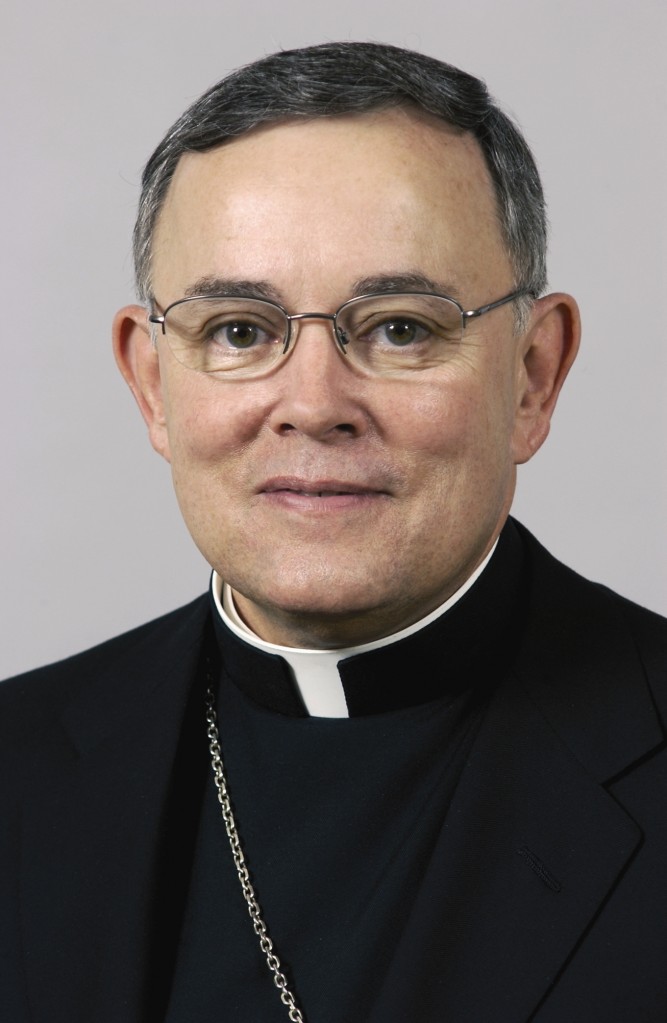 A: I haven’t read the grand jury report yet, and it will be awhile before I fully understand the issues. I need to hear from the people involved in these matters and to learn the facts before I comment.
A: I haven’t read the grand jury report yet, and it will be awhile before I fully understand the issues. I need to hear from the people involved in these matters and to learn the facts before I comment.
I do know that priests’ morale across the country has been seriously wounded by the abuse scandal. I’m sure the priests of Philadelphia carry this burden in their own unique way. But we know that Jesus, when he chooses men to be priests, chooses them with a brother’s love, and I want to be a sign of that love to my brothers. We have to deal with scandal in an honest, thorough, confident way. We can do that, even when it’s very painful, because we know that Christ rose from the dead. “Jesus Christ is risen” — these aren’t just powdered words; they’re a statement of fact. That should give us confidence that what happens in the Church, even when it seems death-dealing, can be turned into a moment of resurrection.
Q: What catches your attention most about the local Church in Philadelphia?
A: I have a lot to learn about Philadelphia, but I’m eager to get started. I did live in western Pennsylvania for 10 years – first as a seminarian, then as a seminary professor, and eventually as a part of the administration of the Capuchin Province of St. Augustine based in Pittsburgh. My time in the state was delightful. I look back on it with great joy. The men and women of Pennsylvania that I’ve met are wonderful people; good, generous and creative. I look forward to being a part of their lives.
Q: You’re a Native American and quite proud of your heritage. Can you talk a little bit about your background, and what that means to you?
A: I’m Native American on my mother’s side. I’m a member of the Prairie Band Potawatomi tribe. Our reservation is in northeastern Kansas.
Being Indian was probably the entry point for my becoming a bishop. One never knows why one becomes a bishop, but my first assignment was the Diocese of Rapid City, South Dakota. I suspect I was sent there was because of my engagement with the Native American Catholic community in the United States. The Holy Father was looking for a way to reach out in special love to the native people. So I see my episcopacy, in some ways, as born from that part of who I am.
The Native American people – the original inhabitants of this land – are a very diverse group with many, many gifts. I’ve always hoped that through my service as a bishop, those gifts can be recognized by the Church all the more, and that the Church can better meet the needs of Native people.
I was blessed to be the first Native American archbishop, and my people were honored by that.
Q: You’re also a Franciscan Capuchin. St. Francis had a pretty radical approach to the Gospel, and the Capuchins were known as reformers within the Franciscan community. How does this shape how you see the Church’s task, and your role as a leader?
A: Francis was radical in the root meaning of the word “radical,” which means to go “to the root” of the matter. He wanted the friars to live the Gospel clearly, without compromise. The word he used was, “without gloss.” It was a custom, in the Middle Ages, to develop commentaries on the Gospel, and sometimes those commentaries would explain away the Christian’s responsibility to live the Gospel without compromise in every moment of our life. Francis rejected any kind of effort to diminish the demands of the Gospel.
Of course, I have to live that discipline personally in my own life. That’s the most important part of my Capuchin identity. But then I have to preach the Gospel in the same kind of way, in a way that’s clear, that’s always fresh, and always without compromise.
Before anything else, we’re called to be Catholics. That should be the defining part of who we are. Whether we’re Indians or Germans or Irish; whether we’re Democrats or Republicans, we are Catholic first. Everything else is secondary. Francis called his brothers not only to live that Catholic identity personally, but to preach that unvarnished Gospel with clarity. And I hope that my service as a bishop always enables me to do that.
Q: You’ve talked about this issue of Catholic identity frequently. Why is that so important to you? Is there something about American culture that encourages people to compartmentalize their faith from the rest of their lives?
A: Many of the dominant themes of our time work contrary to the Gospel. All of us who are Catholics are very much influenced by our culture and by our society’s criticism of the Gospel. Because of these pressures, Catholics are often tempted to be embarrassed by their faith, and to make decisions that are compromised by our desire to somehow please the world, while satisfying God. We often can’t do both. We always need to choose to please God first.
We need the support of the Church, the help of our brothers and sisters in faith, to live the Gospel in this difficult environment. That’s why I’ve spent so much time in these last years, as a bishop, writing and speaking about this. I want the Church to have confidence in the Gospel and Christians to support one another, regardless of the opposition to the Gospel in our culture.
We owe it to our country and the age we live in, to be faithful Catholics. If we’re good Catholics first, then we’re good citizens, and if we’re good citizens, then we’ll be a force of transformation for justice in the world. If we don’t live as faithful Catholics, we betray the Gospel. We forfeit the opportunity God gives us to make a significant difference for the evangelization of culture.
Q: Many Catholics now serve in Congress, in state houses, in governors’ mansions — we even find Catholics as a majority on the Supreme Court. But we often don’t see the content of Christian social teaching reflected in society. Does this relate to that issue of Catholic identity?
A: There’s an obvious temptation, in political life, to compromise Christian virtues and values because of the pressures of the society around us. But I wouldn’t first point to governors, or congressional representatives, or Supreme Court justices. I’d point to ourselves. If our political leaders lack conviction about their faith, it’s because the members of the Church lack conviction about their faith. Political leaders are no different from the rest of us. So if we point fingers at them, we’re also pointing fingers at ourselves, and at the broader Church community.
So the Gospel should be preached, first of all, in the Church. Naturally, we need to preach it to political leaders as well. But they’re not alone – not by a long shot — in their tepidity and compromises of the Gospel. If Catholics in their homes and parishes understand that, they’ll realize that a serious conversion needs to take place in all our lives, and not just in the lives of politicians.
Q: If this applies to every member of the Church, how do you think it applies to bishops? What do you think is the role of a bishop in American society?
A: A bishop, before he’s a bishop, is a Christian. And before he’s ordained, he’s baptized. So I think that anything that we say about Christians, we have to say about bishops, too. And bishops, because they’re raised up to be a sign of the presence of Christ in the Church, need to live the Gospel more clearly and more authentically, without compromise, than anyone else.
We can’t preach to others what we don’t embrace ourselves. And because we sometimes don’t practice these things ourselves, sometimes we’re embarrassed to preach these things to others. This is also why those who are called to preach the Gospel might sometimes be silent.
So I think that bishops always have to be engaged in the process of their own personal conversion – prior to calling others to conversion. At the same time, we can’t let our sins and our failures cripple us; otherwise the Apostles themselves would have stayed silent. We have to practice what we preach. But even if we don’t, we always have to preach the Gospel. And if we preach it to others, conscious that we need to be converted ourselves, then things really will begin to change.
Q: From your perspective as a bishop, where are we as a Church, and as a nation, on the issue of abortion?
A: I think that our country, in some special sense, is going to be judged by God on that issue. If we’re not able to protect the most vulnerable members of our society, then we aren’t living up to the public commitment we have as a nation to protect the life, liberty, and happiness of every individual. The unborn child certainly shares with us our human dignity, and has a right to those protections. That’s why I believe this remains one of the fundamental issues of our time. We can’t be a people of justice if we don’t protect the life of the unborn child.
This is, of course, just one of the pressing issues of our time. Also vitally important is the question of the meaning of marriage. Family life is the foundation stone of all community. It’s the first community that we’re born into. The health of our families will lead to the stability or weakening of our society.
The Church’s efforts today, to protect the traditional meaning of marriage, are on behalf of stable family life, for the sake of children. Marriage is a relationship of a man and a woman, in a stable and faithful way, for the sake of children. The most important thing for our development into mature adults is that we know that our fathers love our mothers and our mothers love our fathers. If we don’t know that, then a certain kind of instability enters our lives. Anything we do, as a country, to undermine that meaning of marriage, creates a danger – a clear danger – to the long-term health of our country.
Q: The fact that civil laws favoring so-called gay “marriage” have been approved in several places, in the last two years, has led some people to say that the Church, and especially the bishops, have “lost the argument” in the American culture. How do you think individual Catholics should approach this issue in their communities? And what is the right role of the institutional church and the bishops?
A: We only lose when we stop working and struggling for what we believe to be true. In a very general sense, the battle was “lost” the day after Golgotha. Except the disciples didn’t get the memo.
I don’t think we’ve lost the marriage issue at all. Even framing the question that way shapes the answer in a wrong direction, because the language of a debate conditions how we think. If we concede the language, we concede the issue. I do think we’ve been allowing ourselves to lose the marriage debate for years, rooted in our confusion about individual and community rights, and our fear of being portrayed as “against” other people. Catholic teaching on sexuality and marriage is for human dignity; it is for human happiness and the virtuous development of family and society. It is “against” only those behaviors that undermine those goals. When people try to frame Catholic belief as an intrinsic hostility for individual persons or groups, they are not being honest.
Cohabitation today without marriage is quite common, with children being born outside the context of married love, and many people are confused about what marriage really means. Generally, people think “marriage” means a loving relationship between two people that has a sexual component. But that’s not what marriage means. It means a specific kind of loving relationship, for the sake of children. And the more we’re confused about that, the more damage we do to ourselves. So we need to have confidence in our faith and keep fighting this fight with a spirit of serenity. The Gospel is true, and the Church is right about the purpose of human sexuality, whether our critics like the message or not. So much is at stake –not just the moral teaching of the Church, but the health of our communities and our country. If we love our country, that means we fight for the things that protect our country and make it strong.
Q: Four years ago you wrote a book on Catholic political and social engagement, “Render Unto Caesar.” If you had to write that book today, would it have a different accent? In other words, what issues look most important to you today for Catholic political involvement in the United States, and in general, Catholic involvement in the public square?
A: When I wrote that book, four years ago, I was responding to a request from a friend – a young husband and father — who had run for state office, but found it troubling because of the pressure in party politics to embrace issues contrary to Catholic belief. I wanted to engage Catholics in a reflection on their responsibility for our country, and how politics can never be separated from faith even though “separation of Church and state,” properly understood, is a principle that’s worked well in our country. My point is that separation of Church and state was never intended to mean that we separate our faith from our social, economic and political life.
I have a high regard for the book’s publisher, and we’ve talked about doing an updated edition of “Render Unto Caesar.” Since my appointment to Philadelphia, I’ve had a certain kind of enthusiasm for a new version. So, give me some time, and you never know. Maybe I’ll have some additional thoughts on faith and public in the 21st century.
The Case for Sainthood
The Catholic Church has a process by which She determines whether or not a man or woman should be named a saint. The process can be long and tedious and involves loads and loads of paperwork, proof, documentation, etc.etc. The “case” is reviewed and then a determination is made. (For more on this process, click HERE.) One such man, Fr. Emil Kapaun, has a case being sent to the Vatican as we speak. The story of Fr. Kapaun is close to my heart, as he was from Wichita, Kansas and a military man. I grew up just 6 miles south of Wichita and as many of you know, have a long and extensive family (and even a personal) history with the military. My Father, Tony, just told me about the opportunity that he and my mother had of attending this special Mass that was held at the Cathedral in Wichita on July 1. We’ll pick up with an Al Kresta story…
“Fr. John Hotze, episcopal delegate for the office of Fr. Kapaun’s beatification and canonization, said the event marks the culmination of years of work and also celebrates the “gift” of Fr. Kapaun.
“The fact that we, unlike any other diocese in the United States, in the world, have been blessed by the example of this saintly man, Father Emil Kapaun, boggles my mind,” he said in a June 30 statement. “How can we do anything less than give praise to God for this gift and strive to follow the example of Father Kapaun’s selfless giving.” Fr. Kapaun, a native of Pilsen, Kansas, served in the Korean War. He courageously rescued wounded soldiers from the battlefield, risking his own life to prevent their execution at the hands of the Chinese. He was captured by North Korean and Communist Chinese forces after he volunteered to stay behind on a battlefield with the injured. The priest’s service to his fellow prisoners has become legendary among those who knew of him. Scores of men attributed their survival to his work tending the starving and the sick.
Fr. Kapaun died in a prison camp hospital on May 23, 1951. The Diocese of Wichita has investigated his life since 2001 and officially opened the cause for his beatification on June 29, 2008.
Andrea Ambrosi, a lawyer investigating the case for the Vatican, told the Wichita Eagle he thinks Fr. Kapaun has a good chance to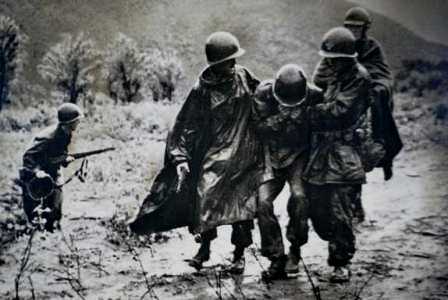 be raised to the altars. “He showed that there was not just a devil working on the battlefields of the war, but something else.” The investigator said Kapaun’s candidacy is unique compared with the hundreds of other cases he has investigated because it is so full of action and detailed. While most cases involve “very holy” priests and nuns who have miracles attributed to them, Fr. Kapaun’s story involves far more deeds of heroism, sacrifice and action.
be raised to the altars. “He showed that there was not just a devil working on the battlefields of the war, but something else.” The investigator said Kapaun’s candidacy is unique compared with the hundreds of other cases he has investigated because it is so full of action and detailed. While most cases involve “very holy” priests and nuns who have miracles attributed to them, Fr. Kapaun’s story involves far more deeds of heroism, sacrifice and action.
Ambrosi has investigated two alleged miracles involving prayers for Fr. Kapaun’s intercession. In 2006 Avery Gerleman, then 12 years-old, was near death for 87 days. She recovered after her parents prayed to Kapaun. In October 2008 Chase Kear, a college track athlete, inexplicably survived a severe pole vaulting accident. His skull was fractured from ear to ear and caused some bleeding on his brain. Doctors said he would likely either die in surgery or from a post-surgery infection. However, family and friends joined in petitions to Fr. Kapaun. Kear survived the surgery and left the hospital only a few days after the incident. Doctors said both recoveries were medically inexplicable. Ambrosi said the intensity of the priest’s devotees is “incredible.” Several Catholic parishes and many parishioners pray for Fr. Kapaun’s intercession every week at Masses and many call upon him when loved ones become ill.
Fr. Hotze said that the diocese has finished collecting information that will “hopefully, with the grace of God, prove Father Kapaun worthy of beatification and then canonization as a saint of the Catholic Church.” Ambrosi and other investigators must now closely study 8,268 documents about the chaplain’s deeds and sacrifices in the Korean War. Those documents are being sent to Rome. If canonized, the priest would become the third American-born saint.”
Clearly, Fr. Kapaun was an incredible man! What a TrueMan! Living virtue at every turn. I wrote another story about him previously, which also includes some video trailers of a film that was made about his life. Click HERE for that story. We hope he is elevated to the distinction of “blessed”!
Fr. Emil Kapaun – Pray for us!
TrueMan up!
Black and Pro-Life – Awesome Video!
July 1, 2011 by admin
Filed under Blog, cultural manliness, Faith, Fatherhood, manliness, Virtue
 I just saw this awesome video from the National Black Pro-Life Coalition (BlackandProLife.org). Take 60 seconds and watch it. It is true and profound. Just because I am not black does not mean that I cannot stand up against this blatant racism and extermination of my fellow Americans. Let our voice be heard, ABORTION MUST STOP!
I just saw this awesome video from the National Black Pro-Life Coalition (BlackandProLife.org). Take 60 seconds and watch it. It is true and profound. Just because I am not black does not mean that I cannot stand up against this blatant racism and extermination of my fellow Americans. Let our voice be heard, ABORTION MUST STOP!
Black men – I want to direct your attention to something. You can play a vital role in the end to abortion! Your role may be THE most important. The statistics do not lie. Stand up for women and children and fight to stop abortion now!
TrueMan up!
Catholic Eucharistic Flash Mob
 Did you see this? A Eucharistic “Flash Mob” put on by some Franciscan brothers and volunteers on
Did you see this? A Eucharistic “Flash Mob” put on by some Franciscan brothers and volunteers on 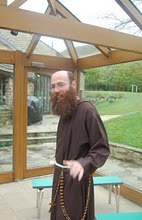 Ascension Thursday.
Ascension Thursday.
Very courageous and SO NEEDED!
Let us not be afraid, let us not cower, let us not be afraid of theculture. Jesus is the way, the truth and the life!
Thank you to Brother Paul, Brother Loarne and to those who courageously stepped up and stood strong for the Truth!
TrueMan up!
Close ‘The Club’ on NBC
June 30, 2011 by admin
Filed under Blog, cultural manliness, Faith, For Women, manliness, pornography
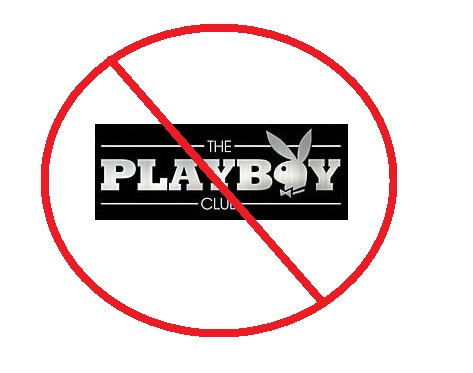 Many groups, including Morality in Media, The Pink Cross Foundation and the Coalition for the War on Illegal Pornography, are working hard to fight a new show that is supposed to begin airing on NBC in the fall. “The Playboy Club” will glamorize and celebritize pornography – this is not a good thing. Many people are in denial, or more perfectly stated, are simply ignorant, to the facts of the dangers of pornography. Study after study show the negative effects, and the law is already in place (ALL hardcore pornography is illegal) but little-to-nothing is done about it. Please support these groups and get
Many groups, including Morality in Media, The Pink Cross Foundation and the Coalition for the War on Illegal Pornography, are working hard to fight a new show that is supposed to begin airing on NBC in the fall. “The Playboy Club” will glamorize and celebritize pornography – this is not a good thing. Many people are in denial, or more perfectly stated, are simply ignorant, to the facts of the dangers of pornography. Study after study show the negative effects, and the law is already in place (ALL hardcore pornography is illegal) but little-to-nothing is done about it. Please support these groups and get ![]() Attorney General Eric Holder and the rest of the Department of Justice involved and prosecuting illegal pornography! Our obscenity and decency laws must be enforced.
Attorney General Eric Holder and the rest of the Department of Justice involved and prosecuting illegal pornography! Our obscenity and decency laws must be enforced.
Here is an article written on just part of the battle. (From Fox News.)
NBC’s new series “The Playboy Club” hasn’t even aired its first episode, and some people already want it off the air.
First, NBC’s Salt Lake City, UT affiliate, KSL-TV, refused to air the show, saying that their station is “completely inconsistent with the Playboy brand.”
Now an anti-porn foundation is determined to shut down the show completely
“What’s shown in ‘The Playboy Club’ is not real—Playboy definitely damages people. It’s pornography, it’s sex trafficking and it exploits women,” the founder of Pink Cross, ex porn actress Shelley Lubben, tells FOX411.com. “The series looks like it’s all cute, taking place back in the old days—it seems harmless, but then they show a quick clip of three people going at it in the bathroom. NBC is breaking the law with this show—they’re not meeting FCC standards.”
The nonprofit group Morality in Media agrees.
“We’re launching a big effort with our web site, closetheclubonnbc.com,” Dawn Hawkins, executive director, Morality In Media, tells FOX411.com. “We’re asking supporters to sign the pledge to and to contact their local NBC affiliates and ask them not to air the show. And as soon as we discover who is sponsoring the show, we’ll ask our supporters to contact them as well.”
Hawkins charges that “The Playboy Club” glamorizes pornography. “We know now, years later, that pornography is very harmful to society. It leads to addiction in children and adults, increased sex trafficking violence against women—and ‘Playboy’ is really the root of all of this. We just don’t want to see it glamorized any further, which it will be if it’s aired on NBC.”
With NBC in fourth place among broadcast networks, new president Steve Burke is under intense pressure to increase ratings. “When he was appointed, Burke said he was going to push the envelope,” Hawkins explains. “They want to get their ratings up, and they know that controversy surrounding this show might help.”
While “The Playboy Club” might help NBC’s sagging ratings, it could also run afoul of federal law.
“We don’t know the specific content of ‘The Playboy Club’ yet, but reports are that it will include simulated sex and nudity,” attorney and president and CEO of Morality in Media Patrick A. Truman tells FOX411.com. “Simulated sex can be prosecuted by Department of Justice as obscene and nudity, so long as it is not obscene, can be prosecuted by the FCC. The U. S. Court of Appeals for the 2nd Circuit struck down FCC’s indecency regulations, but that ruling has application only in that circuit. The U.S. Supreme Court today agreed to hear an appeal of that ruling. We will file an amicus brief.”
In addition to Morality in Media’s filing, Truman is issuing a warning to the network—and to Playboy.
“Every advertiser on The Playboy Club will be boycotted, every local affiliate of NBC will be bombarded by a very large segment of society that is sick and tired of those making money off the sexual exploitation of women,” he said. “The NBC brand, as well as Playboy will suffer great cost.”
NBC did not responded to FOX411.com’s request for comment.
Father’s Day Novena
June 16, 2011 by admin
Filed under Blog, Faith, Fatherhood, manliness, Scriptural Examples, Virtue
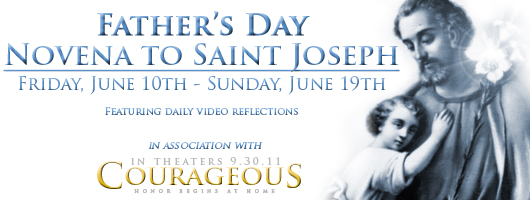 It’s a little late for you to join in the prayers during this novena to St. Joseph, but I encourage you to visit the Father’s for Good site to view the reflections from several men about fatherhood and living as St. Joseph (the Foster Father of Jesus) lived. It’s great stuff and I’m glad to have been a part of it. Sorry it’s coming late… we were just out “Into the Wild” and had a great experience. For more information on Into the Wild, visit www.IntoTheWildWeekend.com.
It’s a little late for you to join in the prayers during this novena to St. Joseph, but I encourage you to visit the Father’s for Good site to view the reflections from several men about fatherhood and living as St. Joseph (the Foster Father of Jesus) lived. It’s great stuff and I’m glad to have been a part of it. Sorry it’s coming late… we were just out “Into the Wild” and had a great experience. For more information on Into the Wild, visit www.IntoTheWildWeekend.com.
This project was spurred on by the team at Maximus Group, a Catholic marketing firm who is promoting a new movie called Courageous that is coming out in September. I’ve pre-screened the movie and it is awesome. More on Courageous to come.
Listen to Mark Houck, Jesse Romero, Steve Pokorny, Bill & Billy Moyer, Chad Faddis and me as we share our thoughts on the great man-saint, St. Joseph. What a TrueMan!
Click HERE to go to the Fathers For Good website.
My Next 30 Years
June 3, 2011 by admin
Filed under Blog, Faith, Fatherhood, Just For Laughs, manliness, Virtue
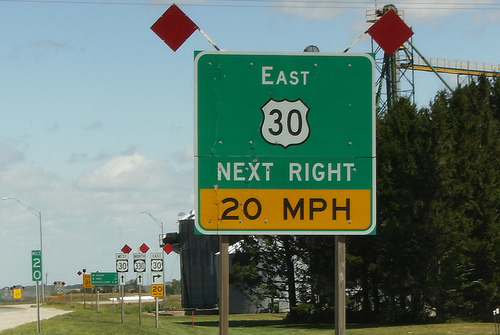 This weekend is the last weekend of my twenties. I’m sort of indifferent about “getting older” – on the one hand realizing that all the aches and pains, the heartburn and the receding hairline are realities and on the other, being excited to move into another chapter with my wife and children and in my professional career.
This weekend is the last weekend of my twenties. I’m sort of indifferent about “getting older” – on the one hand realizing that all the aches and pains, the heartburn and the receding hairline are realities and on the other, being excited to move into another chapter with my wife and children and in my professional career.
When I look back at my twenties, so many things come to mind that were instrumental in my journey to get to where I am today. I desire so strongly to be the man that God created me to be, a TrueMan. I’m not there yet; I’ve got much more to work on. Considering where I was and where I am now, I’m proud of my last 30 years and I’m ready for my next thirty years.
In my twenties… I left and returned to my faith and the One, True Church instituted by Jesus. I have been blessed by God abundantly. I was blessed to meet and marry my best friend – God has since blessed us with three incredible children. I graduated from undergrad and graduate schools. I changed jobs many times – I think I had about 15 different jobs in the last 10 years. At one point, I had only $85 in my checking account and my stuff amounted to about $500. I was laid off twice.  I moved eight times. I bought or sold 6 different vehicles. I learned a ton – mostly about myself and the things that I want to change and be better with. It hasn’t been a super smooth ride. There have been many bumps and bruises along the way, but I find myself coming out of my twenties a much better man then when I entered.
I moved eight times. I bought or sold 6 different vehicles. I learned a ton – mostly about myself and the things that I want to change and be better with. It hasn’t been a super smooth ride. There have been many bumps and bruises along the way, but I find myself coming out of my twenties a much better man then when I entered.
I realize, more and more each day, that I don’t know that I’ll live for another 30 years. I might, I might not. I might live for many more than that. What I know is that I live life to the fullest and do my best to be a witness for Jesus everyday. I hope that comes through clearly in my personal and spiritual life, in my family life, in my professional life, on TrueManhood and in every other setting.
TrueMan up!
*A little funny… I found the above exit sign and thought it was pretty ironic – at mile marker 20, on the exit, which is 20 MPH, towards 30 to the east. Out of 20 towards 30.




